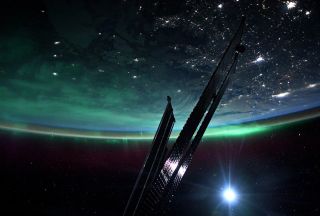
You don't often see Earth's dazzling auroras from this angle.
NASA astronaut Josh Cassada just snapped a stunning shot of the light display from his perch on the International Space Station (ISS), which flies about 250 miles (400 kilometers) above Earth on average.
"Absolutely unreal," Cassada wrote by way of a caption for the photo, which he posted on Twitter on Tuesday (Feb. 28).
Related: Where to see the northern lights: 2023 aurora borealis guide
Cassada is far from the only skywatcher marveling at the auroras these days. The light shows — caused by the interaction of charged solar particles with molecules in Earth's atmosphere — have been supercharged recently by strong sun activity.
Specifically, a "hole" in the sun's outer atmosphere, or corona, souped up the flow of the solar wind, the stream of charged particles flowing constantly from our star. And huge clouds of solar plasma that were rocketed into space by coronal mass ejections slammed into our planet on both Sunday (Feb. 26) and Monday (Feb. 27), adding more fuel to the auroral fire.
As a result, the displays have spread far from the ultrahigh latitudes that are their natural home. (Earth's magnetic field lines tend to channel the charged particles toward our planet's poles.)
Get the Space.com Newsletter
Breaking space news, the latest updates on rocket launches, skywatching events and more!
The wispy, dancing lights wowed observers throughout the British Isles recently, for example, and even made an appearance as far south as California: They were photographed above Death Valley National Park on Monday.
Aurora from Death Valley on 2/27/23. Here is the panoramic - 4 images stitched in Ps. #aurora #deathvalley #spaceweather pic.twitter.com/ohuCC5bTMMFebruary 28, 2023
Cassada arrived at the ISS last October, along with the three other crewmembers of SpaceX's Crew-5 mission — NASA's Nicole Mann, Japanese astronaut Koichi Wakata and cosmonaut Anna Kikina.
The quartet will be able to admire our planet from above for just another week or so, if all goes according to plan: Crew-5 is scheduled to return to Earth about five days after SpaceX's Crew-6 mission arrives at the orbiting lab. Crew-6 is currently slated to lift off early Thursday morning (March 2) from NASA's Kennedy Space Center in Florida.
Mike Wall is the author of "Out There" (Grand Central Publishing, 2018; illustrated by Karl Tate), a book about the search for alien life. Follow him on Twitter @michaeldwall. Follow us on Twitter @Spacedotcomor on Facebook.
Join our Space Forums to keep talking space on the latest missions, night sky and more! And if you have a news tip, correction or comment, let us know at: community@space.com.

Michael Wall is a Senior Space Writer with Space.com and joined the team in 2010. He primarily covers exoplanets, spaceflight and military space, but has been known to dabble in the space art beat. His book about the search for alien life, "Out There," was published on Nov. 13, 2018. Before becoming a science writer, Michael worked as a herpetologist and wildlife biologist. He has a Ph.D. in evolutionary biology from the University of Sydney, Australia, a bachelor's degree from the University of Arizona, and a graduate certificate in science writing from the University of California, Santa Cruz. To find out what his latest project is, you can follow Michael on Twitter.
-
Boonskis I am certain this was fantastic for the lucky few: it is unfortunate, though, how the media and people in general seem more interested in having someone else see auroras from a plane or from space on our behalf, and snap a photo of it for us to view on our computers than to actually go outside and see the night sky for ourselves. I can tell you, the experience is FAR better. But we need to take care of our environment to continue enjoying them: clean air, reduced light pollution will mean you can see them when you are older, too. Right now, there's no guarantee.Reply
